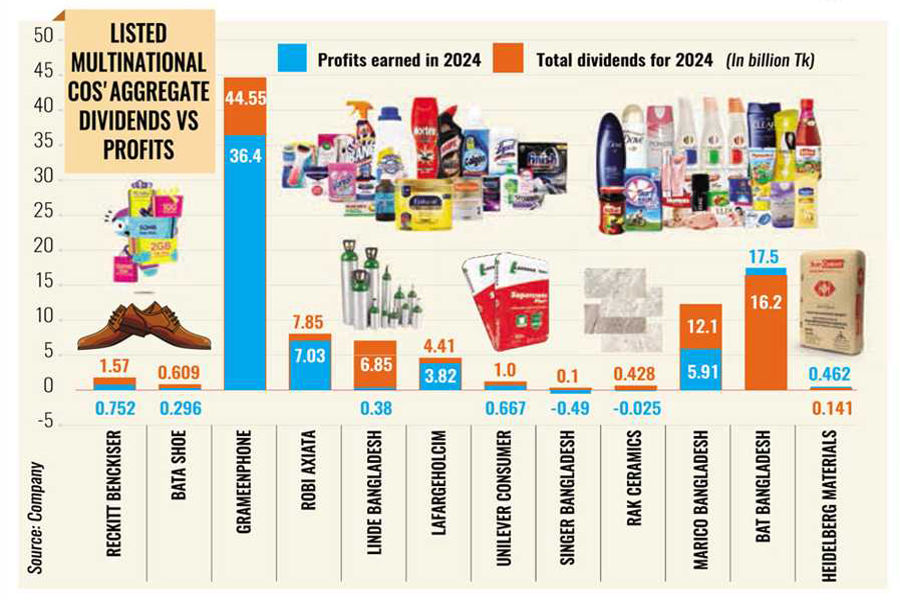Foreign cos to pay shareholders more cash than earned. Here's why

Published :
Updated :

Protests against Israel in early April unexpectedly turned hostile towards multinational companies. Bata Shoe endured significant losses in the violent episode as men stormed into its shops in several cities across Bangladesh, ransacked and looted them.
The looters used the pretext that Bata Shoe has ties to Israel, a misperception that the shoemaker dispelled later on by saying it is a privately held, family-owned company founded in the Czech Republic, with no political links to the Israel-Palestine conflict.
After the damage was done, Bata Shoe declared a record 445 per cent cash dividend for its shareholders for 2024, the highest since its 1985 stock market listing, despite a 26 per cent year-on-year decline in profit in the year.
The shoemaker will provide Tk 609 million in cash dividends for the year against a profit of Tk 296 million, meaning the additional Tk 313 million will come from retained earnings.
Most other multinational companies too declared record dividends for 2024, more than what they earned in the year, indicating repatriation of retained earnings.
While many market operators say the improved availability of dollars is the reason why companies have considered sending high dividends to their sponsor-directors, investment analysts see signs of worry in the trend of record dividend payments.
They say foreign companies are taking away retained earnings in the form of dividends, with sponsor-directors holding majority stakes. And it is happening because companies are not optimistic about reinvesting in Bangladesh to fuel business growth.
"When the reinvestment opportunity squeezes, the cash-surplus companies declare higher dividends to their shareholders, which will be paid from retained earnings," said Akramul Alam, head of research at Royal Capital, a top-tier brokerage firm.
"The boards of multinational companies might think that the current business climate is not favorable for expansion or reinvestment."
Twelve multinational firms altogether declared cash dividends worth Tk 96 billion whereas they earned profits amounting to Tk 73 billion in 2024, according to the companies' audited financial statements.
That means the companies will spend an additional Tk 23 billion from retained earnings to pay dividends, nearly 90 per cent of which will go to sponsor-directors.
Grameenphone, Bata Shoe, Reckitt Benckiser, Robi Axiata, Linde Bangladesh, LafargeHolcim, Marico Bangladesh and Unilever Consumer Care declared record dividends for 2024, more than their annual profits.
Two companies -- Singer Bangladesh and RAK Ceramics -- declared dividends despite losses in 2024. That means dividends will be paid entirely from retained earnings. Linde Bangladesh declared a record 4,500 per cent cash dividend for 2024. The cash will come from the sale proceeds of its subsidiary.
Businesses have been navigating economic headwinds since the outbreak of Covid without any respite as it was followed by the Russia-Ukraine war, political uncertainty and recently the gas price hikes.
The Foreign Investors Chamber of Commerce and Industry (FICCI) expressed grave concern over the 33 per cent gas price hike, saying the revised tariff structure may discourage industrial growth and foreign investment.
"A transparent and equitable energy pricing framework is fundamental to sustaining investor confidence and industrial growth," said Zaved Akhtar, president of FICCI, in a statement.
Above all, an asset manager, speaking on condition of anonymity, said the worsening law and order situation in the country and uncertainties hanging over next general elections compelled foreign companies to repatriate retained earnings.
"Recent attacks on outlets of foreign companies struck fear into foreign investors," said the asset manager.
Marico Bangladesh, India-based multinational company, will pay Tk 12.1 billion in cash dividends while it made a profit of Tk 5.70 billion in the year that ended in March this year.
This is the highest-ever annual cash dividend for Marico since its stock market listing in 2009 and the second highest annual cash dividend in the country's capital market history after Linde Bangladesh's record dividend.
Tension between Bangladesh and India escalated after the ouster of former prime minister Sheikh Hasina. Businesses are bracing for possible repercussions.
Experts say foreign investors tend to invest more during elected governments as they seek long-term policies, something that can generally be assured by elected representatives.
The current interim government will remain in power for a short term. This is another reason behind companies' reluctance to reinvest.
"Businesses have adopted a wait-and-see approach for fresh money injection or reinvestment," said Rupali Haque Chowdhury, president of the Bangladesh Association of Publicly Listed Companies.
Inflation has remained above the 9 per cent mark for around two years, slowing down sales.
Recently, the revenue board raised value-added tax and supplementary duties on a basket of more than 100 products and services, adding to the challenges.
"We need long-term fiscal policy as a way to attract investment as well as infrastructure development," said Ms Chowdhury, also managing director of Berger Paints.
Meanwhile, the net foreign direct investment (FDI) plunged to a five-year low of $1,270.39 million in 2024.
Reinvestment of earnings took the biggest hit, having fallen 19 per cent year-on-year, according to the Bangladesh Bank data, to $621.95 million in 2024, a reflection of the increasing trend of repatriating retained profits.
Investment analysts and economists warn that the decline in investment manifests deeper structural issues -- regulatory delays, rising operational costs, energy shortage, and currency volatility -- which may be dissuading both new and existing foreign investors from investing in Bangladesh.
They emphasised the need to modernise policy and regulatory frameworks for investments, improve regulatory service delivery and transparency to minimise red tape, deploy automated government-to-business engagements and ensure a reliable energy supply.
"We must prioritise improving the business environment to regain momentum," said Ms Chowdhury.
babulfexpress@gmail.com


 For all latest news, follow The Financial Express Google News channel.
For all latest news, follow The Financial Express Google News channel.